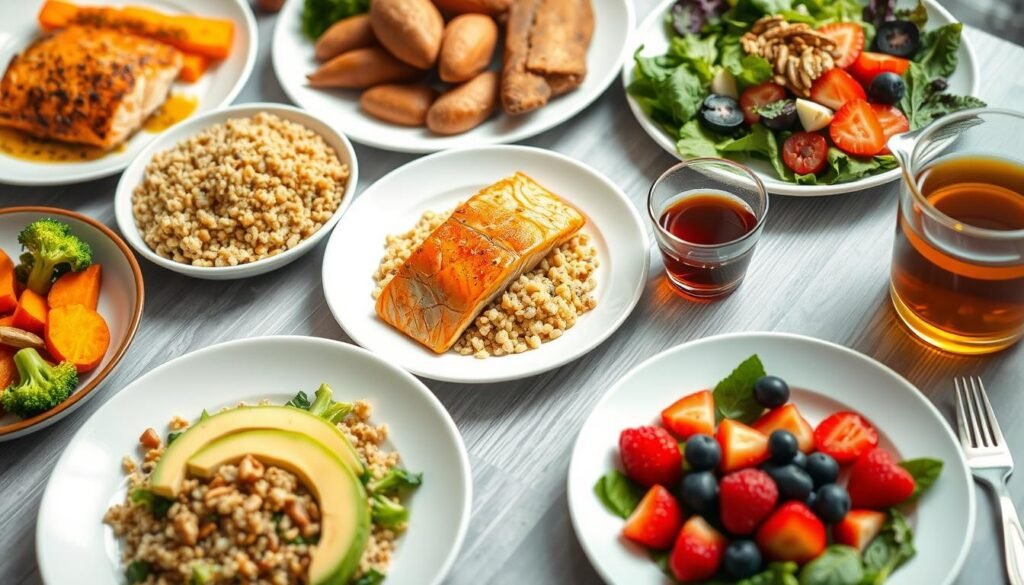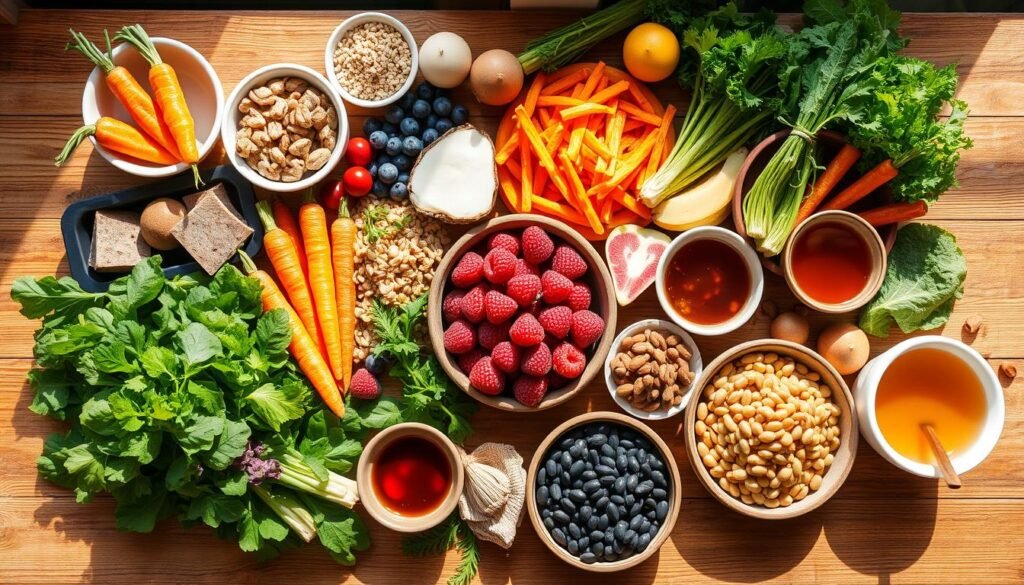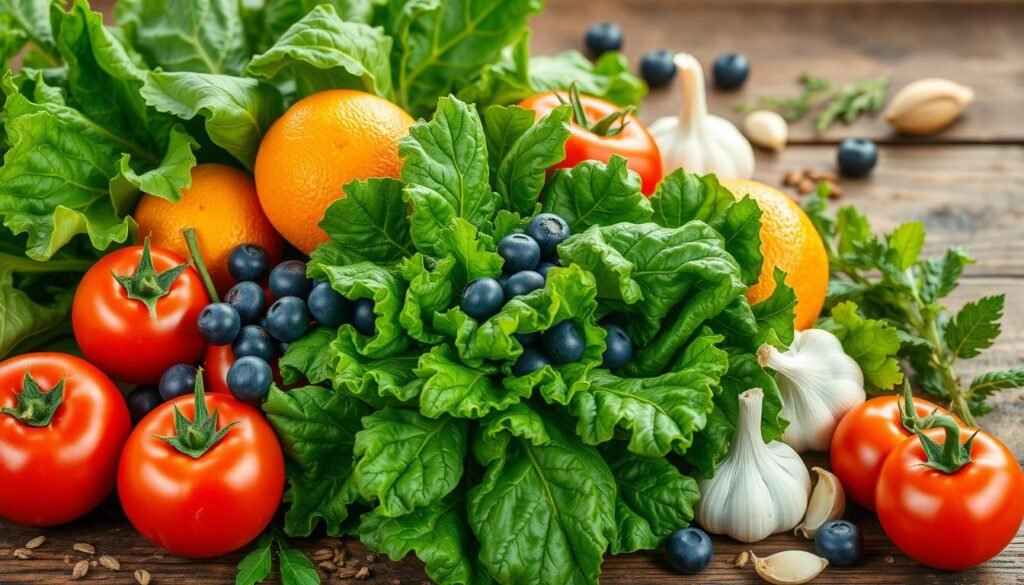Many lung cancer patients, about 85% in fact, struggle with keeping a healthy diet. This is mostly due to chemotherapy and radiation therapy side effects. It’s really important to focus on nutrition during this time. Good nutrition can help ease side effects and improve life quality.
For those fighting lung cancer, it’s crucial to eat foods rich in calories and nutrients. Including calorie-dense foods like whole milk, oils, and nut butters in daily meals is a good strategy. These help meet energy needs. Also, they should try to either maintain or gain weight with cancer-fighting and anti-inflammatory foods.
Help from dietitian nutritionists and support from family make a big difference. Around 90% of patients feel they can manage their diet better with professional advice. The right diet plays a key role in recovery.
Key Takeaways
- 75% of lung cancer patients experience dietary impact from side effects.
- 85% struggle with maintaining a proper diet during treatment.
- 60% report improvements with a bland, nutritious diet.
- 90% feel more supported with the guidance of a registered dietitian.
- 70% of caregivers are willing to assist in meal preparation.
- High-calorie foods are essential in maintaining weight during treatment.
Understanding the Importance of Nutrition During Lung Cancer Treatment
Good nutrition is key for those going through lung cancer treatment. It helps to keep strength up and improve how well someone can handle treatment. Dietitians say a balanced diet won’t cure cancer, but it does aid in maintaining energy and coping with side effects.
Diet needs can differ based on the lung cancer type and stage. Patients with non-small cell lung cancer (NSCLC), for instance, might have different dietary needs than those with small-cell carcinoma. Tailoring diet plans during treatment is crucial for better health.
Eating immune-boosting foods like leafy greens, berries, and omega-3 rich fish is beneficial. These foods fight oxidative stress, a big player in lung cancer’s development.
Every year, over 14.1 million people are diagnosed with lung cancer around the world. This emphasizes the need for effective nutrition strategies. A well-rounded nutritional approach is essential, helping to manage weight loss and boost health outcomes during cancer care.
Essential Nutrients for Lung Cancer Patients
Nutritional needs for lung cancer patients can be different because of their treatment. It is key to get a balanced mix of essential nutrients. This helps with recovery, keeping energy up, and staying healthy.
Proteins: The Building Blocks of Recovery
Proteins are important for fixing cells and helping the immune system. People getting treatment should aim for about 20 grams of protein per meal. Foods like lean meats, eggs, dairy, nuts, and legumes are great sources.
Adding high-protein snacks such as Greek yogurt or mixed nuts is good. It helps you reach your daily protein goal while giving you more calories.
Healthy Fats: Reducing Inflammation
Healthy fats are important for lowering inflammation and keeping the brain healthy. Foods like avocados, olive oil, and nuts are good for an anti-inflammatory diet. Omega-3s, found in salmon, are good for the immune system and well-being.
Eating these fats adds flavor and is key to a healthy diet.
Carbohydrates: Maintaining Energy Levels
Carbs are necessary for keeping energy up, which is very important for lung cancer patients. Eating whole grains, like brown rice and whole-wheat bread, gives you steady energy. These grains are better than refined ones. They help keep energy levels high all day and support recovery.
Food for Lung Cancer Patients: What to Include in Your Diet
Eating right is key for lung cancer patients. Foods that are good for lung cancer can help a lot with recovery and well-being. It’s smart to eat lots of protein and a variety of fruits and veggies. These foods have the nutrients needed during treatment.
High-Protein Foods
For those in treatment, high-protein foods keep muscle and energy levels up. Think about adding fish, poultry, eggs, and low-fat dairy to your meals. Such foods not only build strength but also help in healing. Try to get 1.2 to 1.5 grams of protein per kilogram of your body weight each day. Eating snacks like nuts or peanut butter can up your protein, especially when you’re not feeling hungry.
Fruits and Vegetables: Antioxidant Powerhouses
Fruits and veggies are super important for fighting cancer, especially for lung cancer. They’re full of antioxidants which fight harmful stress in the body. Aim for at least five servings a day. Mix it up with berries, greens, and cruciferous veggies for a wide range of nutrients. To get the best out of your fruit and veggie intake, talking to a healthcare expert is a good idea.
Sticking with these nutritious choices helps with the effects of lung cancer treatments. Choose whole foods over processed ones. Getting advice that’s specific to you is crucial for the best health during treatment. For more tips on what to eat, check out this resource.
| Food Type | Examples | Benefits |
|---|---|---|
| High-Protein Foods | Fish, Poultry, Eggs, Low-Fat Dairy | Supports muscle mass, energy levels |
| Fruits | Berries, Apples, Bananas | Rich in antioxidants, helps combat oxidative stress |
| Vegetables | Leafy Greens, Cruciferous Vegetables, Carrots | Provides vitamins and minerals, cancer-fighting properties |
Creating Nutritious Meals: Tips and Ideas
Planning meals in advance helps lung cancer patients eat better. Meal prepping saves time and keeps nutritious foods ready. It’s key for managing energy and enjoying good meals.
Meal Prepping for Energy and Convenience
Batch cooking and freezing meals support a healthy diet. It lets patients focus on getting better, not cooking daily. The plan includes:
- Small, frequent meals to keep energy up, eating four to six times a day.
- Each meal should have protein, about 20 grams, from chicken, fish, beans, nuts, or tofu.
- Pre-pack snacks like yogurt or cheese and crackers for when tired.
- Include lots of fruits and veggies for vitamins and minerals, boosting health.
Simple Recipes for Nutritious Meals
Simple recipes make meal prep both fun and healthy. Some easy recipes are:
- Protein-Packed Smoothie: A blend of yogurt, banana, and protein powder makes a tasty drink.
- Vegetable Casserole: Bake leafy greens, cheese, and a protein like chicken or beans for a cozy meal.
- Nut Butter Banana Toast: Almond or peanut butter on bread with banana slices is a great snack.

Meal prepping with simple recipes keeps lung cancer patients well-fed during recovery. It’s a smart way to eat right and stay healthy.
| Meal Type | Protein Source | Easy-to-Digest Recipes |
|---|---|---|
| Breakfast | Yogurt | Overnight oats with fruits |
| Lunch | Chicken | Quinoa salad with mixed vegetables |
| Dinner | Tofu | Stir-fried vegetables with brown rice |
| Snack | Nuts | Nut butter on apple slices |
High-Calorie Snacks for Weight Maintenance
Keeping weight on during lung cancer treatment is tough. Snacking often is key for getting needed calories and nutrients. High-calorie snacks help meet calorie needs without big meals. They make sure patients get enough energy and still enjoy what they eat.
Energy-Dense Snack Options
There are many good choices for energy-packed snacking. High-calorie snacks taste great and up calorie intake a lot. Here are top picks:
- Creamy cheese
- Rich ice cream
- Dried fruits such as apricots and raisins
- Peanut butter on crackers
- Cottage cheese and fruit
- Chocolate milk
Examples of High-Calorie Foods
Choosing the right high-calorie foods is very important. Below is a list of popular snacks and their calories:
| Food Item | Calories per Serving |
|---|---|
| Peanut Butter (1 tablespoon) | 94 |
| Cheese Toast (1 serving) | 175 |
| Cheese Pizza (1 serving) | 300 |
| Chocolate Milk (1 cup) | 200 |
| Trail Mix (1 serving) | 582 |
| Tuna Salad on Crackers (snack) | 440 |
| Granola Bar with Yogurt (snack) | 480 |
| Canned Fruit in Heavy Syrup (1 cup) | 300 |
Adding these high-calorie foods to daily meals helps lung cancer patients keep their weight up. Eating nutritious meals with these snacks boosts health and energy.
Managing Side Effects Through Diet
Good nutrition plays a big part in dealing with cancer treatment side effects. Nausea and lack of hunger are common issues. Small changes in what you eat can help with these symptoms and keep you nourished.
Nausea and Loss of Appetite
Chemotherapy often causes nausea. To manage this, eat five to six smaller meals a day instead of big ones. It’s easier on your stomach and can lessen nausea.
Adding bland, easy-to-digest foods to your meals is also helpful. Here are some gentle options:
- Oatmeal and cream of wheat
- Plain rice or pasta
- Cottage cheese
- Applesauce or Jell-O
- Mashed potatoes and toast
These foods can reduce discomfort and help you eat better during treatment.
To fight loss of appetite, focus on calorie-rich foods. Eating snacks between meals helps keep your calorie intake up. Try nuts, cheese, and nutritional drinks for energy and appeal.
Tailoring eating approaches to what you like can also help. For instance:
- Try different flavors and textures
- Include smoothies for easy eating
- Eat favorite foods that bring back good memories
Choosing the right meals and snacks makes managing nausea and appetite easier during cancer treatment. Knowing how to eat well supports your overall health.

| Side Effect | Dietary Approach | Recommended Foods |
|---|---|---|
| Nausea | Frequent small meals | Oatmeal, toast, rice |
| Loss of Appetite | High-calorie snacks | Nuts, cheese, smoothies |
| Vomiting | Clear liquids first | Broth, herbal tea |
| Constipation | Increase fiber intake | Dried fruits, whole grain cereals |
| Diarrhea | Small, bland meals | Bananas, white rice, applesauce |
Soft Food Options for Easy Consumption
People being treated for lung cancer need to eat soft foods. This is especially important for those having trouble swallowing or with mouth sores. Soft foods are not only easier to eat but also important for staying nourished. Foods like mashed potatoes, yogurt, and broth-based soups keep nutrition up and discomfort down.
What should patients eat? Here’s a list:
- Mashed potatoes
- Applesauce
- Greek yogurt
- Broths and cream soups
- Steamed vegetables like carrots and squash
- Hummus and dips made from beans
These foods are packed with nutrients needed for recovery and are easy to digest. Yogurts, especially those with probiotics, are good for gut health. For more ideas, use recommended soft diet meals.
Soft food helps keep weight and energy up during treatment. Foods like avocados and cottage cheese are nutritious and simple to eat. These foods help create a balanced diet while dealing with side effects.
Eating these foods helps patients enjoy meals without missing out on key nutrients, aiding in their recovery. Always talk to a doctor or dietitian to customize a soft diet for personal needs. This will help improve overall health.
For more meal ideas for lung cancer patients, check out easy-to-digest recipes focusing on comfort and nutrition.
Immune-Boosting Foods to Enhance Recovery
Adding foods that boost the immune system is key during lung cancer treatment. These foods are packed with vitamins and nutrients. They help improve health by making the immune system work better. Eating a variety of fruits and veggies is vital for maximizing these effects.
Vitamin-Rich Dishes to Include
It’s good to focus on meals rich in vitamins with different ingredients. Try to eat about five servings of fruits and veggies every day. This will greatly improve your nutrient intake. Leafy greens, citrus fruits, and bell peppers are excellent because they are full of vitamins.
- Leafy Greens – Spinach, kale, and arugula offer vitamins A, C, and K.
- Citrus Fruits – Oranges, grapefruits, and lemons boost vitamin C for immune support.
- Bell Peppers – They come in red, yellow, and green, giving lots of vitamins A and C.
- Berries – Blueberries and strawberries increase antioxidant levels.
- Carrots – Full of beta-carotene, which turns into vitamin A.
Mixing these foods into meals can boost their ability to enhance the immune system. For example, a colorful salad with olive oil and nuts. Or a smoothie with spinach, banana, and orange juice. Both are tasty, nutrient-filled foods that aid in recovery.

Easy-to-Digest Recipes for Lung Cancer Patients
Creating recipes that are easy to digest is vital for lung cancer patients. These recipes help them keep up their nutrition without feeling uncomfortable. They use soft grains, gentle veggies, and tasty broths to give necessary nutrients while being easy on the stomach.
- Lentil soup with collards and a hint of cumin for flavor.
- Sweet potato mash enriched with cream and a touch of honey.
- Salmon fillet paired with mashed avocado and steamed vegetables.
- Vegetable broth-based risotto with finely chopped carrots and parsnips.
- Greek yogurt smoothie with canned mango and ice for a cool treat.
Pairing these meals with the right drinks can make eating more enjoyable. For example, a little red wine can go well with many dishes.
Using gadgets like the Instant Pot makes cooking fast and straightforward, perfect for those feeling tired. Cooking in a way that makes food soft ensures it stays easy to digest.
| Ingredient | Nutritional Benefits |
|---|---|
| Lentils | High in protein and fiber, supporting recovery. |
| Collards | Rich in vitamins and good for the brain. |
| Sweet Potatoes | Full of vitamins and help with digestion. |
| Greek Yogurt | Great for protein and gut health. |
| Salmon | Has omega-3s for fighting inflammation. |
| Honey | A natural sweetener with antioxidants. |
It’s important to mix different flavors and textures in meals. Patients should try to eat six servings of dark leafy greens every week. This boosts their nutrient intake while enjoying easy-to-swallow recipes.
Conclusion
Eating well is key for those fighting lung cancer, as it greatly affects their health while under treatment. By focusing on what they eat, patients can feel better, handle side effects better, and have a better life. It’s helpful to eat high-calorie and nutrient-rich foods to keep energy up and help with recovery.
When dealing with issues like losing your appetite or how food tastes, knowing which foods are best is crucial. Strategies like preoperative immunonutrition, adding antioxidants, and eating more protein can improve how well treatment works. It’s also key to know how taste changes can affect eating habits, as 35-69% of lung cancer patients face these issues.
Talking to healthcare experts to choose the right foods for each person ensures they get the best support. A smart plan for eating well during treatment helps lung cancer patients lead healthier lives. It gives them strength to face their disease with courage.